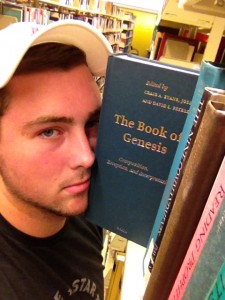Incest within the Bible.
Throughout reading the Bible we have seen various accounts and quotes about incest and incestuous relationships between brother and sister, daughters and father as well as son and mother. The Bible says nothing wrong about incest until the time of Moses where God commanded against it. We see a couple of situations in Genesis alone.
“Besides, she is indeed my sister, the daughter of my father though not the daughter of my mother, and she became my wife.” (Genesis 20:12)
Before God had commanded against it, it was not considered incest. For instance, in Genesis 4, the story of Adam and Eve and their two sons Cain and Abel. If Cain and or Abel (not stated in the Bible) didn’t lay with Eve, there wouldn’t have been a human race or any humans today because the Bible clearly states that Cain, Abel and Seth were the only children of Adam and Eve. The second generation would have to marry their cousins just like after the flood in the story of Noah. Incest wasn’t a problem back then because it was free of defects. In modern day, it has such a high risk of causing abnormalities in the children. Since this was not an issue in the early centuries of humanity, what occurred between Adam and Eve’s children and Abraham and Sarah should not be viewed as incest. It did not become “incest” until God commanded against it when he realized that the genetic pool had become polluted enough that it was no longer safe to have intermarriage. Just like Abraham and his half sister, their marriage and relationship wasn’t considered incest, for God had not commanded against it at that time.
http://www.gotquestions.org/incest-in-the-Bible.html
We also see another situation in Genesis where incest occurs between daughters and father:
” Now Lot went up out of Zoar and mlived in the hills with his two daughters, for he was afraid to live in Zoar. So he lived in a cave with his two daughters. And the firstborn said to the younger, “Our father is old, and there is not a man on earth to come in to us after the manner of all the earth. Come, let us make our father drink wine, and we will lie with him, that we may preserve offspring from our father.” So they made their father drink wine that night. And the firstborn went in and lay with her father. He did not know when she lay down or when she arose. The next day, the firstborn said to the younger, “Behold, I lay last night with my father. Let us make him drink wine tonight also. Then you go in and lie with him, that we may preserve offspring from our father.” So they made their father drink wine that night also. And the younger arose and lay with him, and he did not know when she lay down or when she arose. Thus both the daughters of Lot became pregnant by their father. The firstborn bore a son and called his name Moab. He is the father of the Moabites to this day. The younger also bore a son and called his name Ben-ammi. He is the father of the Ammonites to this day.” (Genesis 19:30-38)
The raping of Lot by his daughters occurred right after their home town of Sodom was destroyed by God. The turning of Sodom’s wife into a salt pillar left only Sodom and his two daughters locked away in a cave. The daughters were worried they were the last people left in the world and were unmarried and had no children. They planned to get their father drunk in order to get pregnant from him so they could have children. In the first five verses of Deuteronomy, it describes three types of individuals who were allowed to live in the land of Israel but who were forbidden to participate “in the gathering of the nation for religious purposes…:” and one of these three types was an Ammonite or a Moabite. According to the liberal theologians and their interpretation of this story was that it was no actually true, but it served as a way to discredit the Ammonites and Moabites because they were idol worshippers. This was a way of casting shame upon them.
http://www.religioustolerance.org/chrincest.htm
